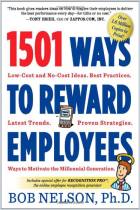Corporate employees must contend with downsizing, scarce jobs and scarcer benefits. In today’s virtual corporations, a handful of employees do the work that many people used to do. To survive, make yourself an irreplaceable employee. That’s the short, sweet, familiar point (and the only message, given the book’s brevity) that Bob Nelson conveys in this simple but clear manual for long-term employment survival. Take the initiative, assume responsibility, know your job better than anybody else and fulfill your supervisor’s expectations – even the unspoken ones. Become indispensable: it’s here in a nutshell. getAbstract finds that Nelson provides valuable tips on being a proactive employee and, for fun, illustrates them with some bright little stories.
Don’t Just Get By
Does your boss have to tell you what to do? Or, do you figure out what needs to be done and do it? If you take the initiative, congratulations, you are more likely to keep your job. To survive in today’s competitive workplace, accept full accountability for your overall job goals. Companies hold on to go-getters. Are you one?
Try to hear what your boss really wants when he or she gives you an instruction. When the boss says, “Send a contract,” does that really mean, “Follow up on the issues raised, bring it to closure”? Try to hear the implicit instructions. When you are told to “select a supplier,” understand that you will need to “create criteria and a selection process” and get competitive rates. If your supervisor complains, “Our overhead is increasing,” that’s a message to find ways to cut expenses. This is more than just taking initiative; this is understanding the full scope of your job.
“Think – What Needs to Be Done?”
To do your job better, or to improve overall operations at your company, begin with ideas about how you and the company can do things better. Carefully survey your work. Determine what areas you can improve and...
Bob Nelson writes books on management, including 1001 Ways to Reward Employees. He is an authority on employee recognition, rewards, motivation, morale, retention, productivity and management.

















Comment on this summary or Start Discussion